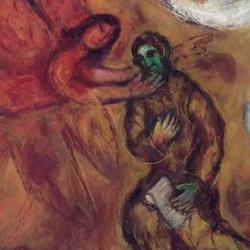Yahweh will take some of the clusters from Judah to make new wine (Isaiah 65:8-9). Those who seek Yahweh will inherit land (v. 10). But those who forsake him are in danger.
Isaiah ends the section with a beautifully constructed set of four contrasting beatitudes and curses (65:13-14). Each verset begins with hinneh, “behold,” and a clause about Yahweh’s “servants.” The second part of each verset states a curse against those who forsake Him, a curse that contrasts with the beatitude of the first clause.
The first three set up a punchy contrasting rhythm, even more compressed in Hebrew than in English: servants eat, you hunger; servants drink, you thirst; servant rejoice, you shamed. (This last contrast is intriguing, and worth more investigation than I give it here.)
But the rhythm is broken in the final contrast. For starters the beatitude has a qualifying prepositional phrase: “servants shout-with-joy with a good heart” (v. 14). This is directly contrasted with the following clause: “you cry out with pained heart.” But the curse gets repeated, and repeated: “you wail with a broken spirit.” The double curse brings a finality to the entire poem.
Plus, the double curse is chiastically arranged:
A. You cry out
B. with pained heart
B’. With broken spirit
A’. you wail.
So the break in the syntactical rhythm that gives the sense of an ending is strengthened by the ring structure of the last two clauses. One-two-one-two-one-two; one-two-three, one-two-three, three-two-one.
The numerology of the poem is also notable. There are four blessings and four curses, suggesting a four-cornered abundance and deprivation. But the final clause breaks out into a fifth curse, as a broken spirit is added to the pained heart.
And that addition turns the poem in a quite unexpected direction. “Broken spirit” (ruach-shevarah or mishshever-ruach) is used only a handful of times in the Hebrew Bible, most famously in Psalm 51:17, where David is assured that his broken spirit and contrite heart constitutes a fitting sacrifice for Yahweh.
In the end, the “you” of the poem is given hope. If the Lord’s discipline does turn them to cries and wails from a broken spirit, then their idolatry may still be healed. Those who have been sacrificing to Destiny and Fortune may yet be turned, so that they offer the sacrifice that pleases Yahweh, a sacrifice of penitence.










